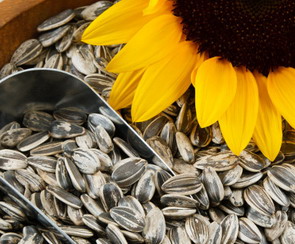Women Healthy -

Sunflower seeds save a lot of health benefits. Sunflower seeds are an excellent source of polyunsaturated fats, making sunflower seeds are a good food for heart health. But other than that sunflower seeds are a great source of other valuable nutrients as well.
Sunflower seeds are indeed a very rich source of vitamin E; contain about 35.17 g per100 g. And also Sunflower seeds contain large amounts of folate. Folate is an important nutrient for our health. It is Vitamin B plays an important role in the production of new body cells by helping to form DNA and RNA. Folate and Vitamin B 12 helps to form hemoglobin in red blood cells. Folate also helps in lowering the risk of heart disease. Sunflower seeds also contain zinc that beneficial to keep our immune system remain strong.

Sunflower seeds also contain a good amount of magnesium. Magnesium helps prevent asthma, lowering high blood pressure, and prevent migraine headaches.
Dietary fiber in sunflower seeds controlling cholesterol and blood glucose levels and also promote good digestion. Sunflower seeds contain tryptophan - an amino acid that helps to produce serotonin.
Selenium is a mineral that plays an important role in overall health. It helps to repair DNA, reduce the growth of cancer cells. Selenium works with vitamin E and helps prevent heart disease as well. Sunflower seeds are rich in selenium, and this is another reason why the sunflower seeds are very good for our health.
Nutrition Fact of sunflower seeds
Almost 90% of the fat in sunflower seeds are good fats, unsaturated fats. Sunflower seeds also contain monosaturated fats that help lower total cholesterol and LDL cholesterol (bad cholesterol) and increase HDL cholesterol (good cholesterol). In addition, sunflower seeds contain Vitamin E and Vitamin B 1 (Thiamin). Manganese, magnesium, copper, selenium, phosphorus, vitamin B 3 (niacin), vitamin B5 (Pantothenic) and folate can also be found in good numbers in the sunflower seeds.
| Nutritional value per 100 g based on USDA | |
|---|---|
| Energy | 2,445 kJ |
| Carbohydrates | 20 g |
| Sugars | 2.62 g |
| Dietary fiber | 8.6 g |
| Fat | 51.46 g |
| saturated | 4.455 g |
| monounsaturated | 18.528 g |
| polyunsaturated | 23.137 g |
| Protein | 20.78 g |
| Thiamine | 1.48 mg |
| Riboflavin | 0.355 mg |
| Niacin | 8.335 mg |
| Pantothenic acid | 1.13 mg |
| Vitamin B6 | 1.345 mg |
| Folate | 227 μg |
| Choline | 55.1 mg |
| Vitamin C | 1.4 mg |
| Vitamin E | 35.17 mg |
| Calcium | 78 mg |
| Iron | 5.25 mg |
| Magnesium | 325 mg |
| Manganese | 1.95 mg |
| Phosphorus | 660 mg |
| Potassium | 645 mg |
| Sodium | 9 mg |
| Zinc | 5 mg |
Health Benefits Of Sunflower seeds
1. Heart Health
Sunflowers are a source of vitamin E, which plays a very important role in the prevention of cardiovascular disease. Vitamin E is an antioxidant that helps keep free radicals from oxidizing cholesterol. Only when oxidized, cholesterol can stick to blood vessel walls and cause atherosclerosis, which can lead to clogged arteries, heart attack, or stroke. We can get more than ninety percent of the daily value for vitamin E in just a quarter cup of sunflower seeds.
2. Anti-inflammatory
Sunflower seeds are a source of vitamin E is fat-soluble. Vitamin E travels throughout the body neutralizing free radicals that would otherwise damage fat-containing structures and molecules, such as cell membranes, brain cells, and cholesterol. By protecting cellular components and molecular, vitamin E has anti-inflammatory effects that result in the reduction of symptoms in asthma, osteoarthritis, and rheumatoid arthritis.
3. Cancer prevention
Sunflower seeds are a source of selenium. Studies show a strong correlation between low selenium intake and cancer incidence. Selenium has been shown to induce DNA repair and synthesis in damaged cells, to inhibit cancer cell proliferation, and to induce their apoptosis, self-destructive mechanism the body uses to get rid of damaged cells or abnormal.
In addition, selenium in the active site of proteins, including glutathione peroxidase, that very important for protection against cancer. One of the strongest antioxidant enzymes the body, glutathione peroxidase is used by the liver to detoxify a large molecule that dangerous. A quarter cup of sunflower seeds provides over thirty percent of the daily value for selenium. Vitamin E in sunflower seeds have also been shown to reduce the risk of colon cancer, bladder cancer, and prostate cancer.
4. Bone health
Sunflower seeds are rich in magnesium, calcium is necessary for strong bones, but magnesium is also very instrumental in this regard. Most of the magnesium in the human body needs is to meet the needs of the sector in the bone.
Lack of magnesium causes high blood pressure, muscle tension, migraine headaches, pain and fatigue. Not surprisingly, studies have shown that magnesium helps reduce the frequency of migraine attacks, lowers blood pressure and helps prevent heart attacks. Sunflower seeds also contain tryptophan, an amino acid that helps produce serotonin, an important neurotransmitter. Serotonin relieves tension, calms the brain and promote relaxation.
5. Skin Protection
Vitamin E is sometimes described as a "lightning rod" of the cell, allowing reactive molecules to strike the cell, such as a flash, without causing damage. Function of vitamin E is very clear in the case of the skin, because vitamin E directly protects the skin from ultraviolet radiation.









